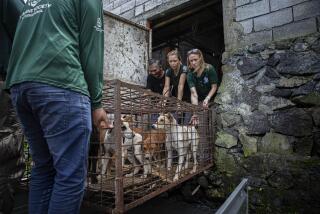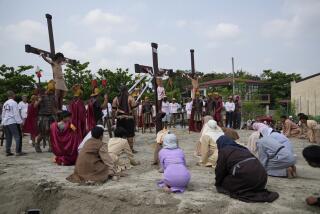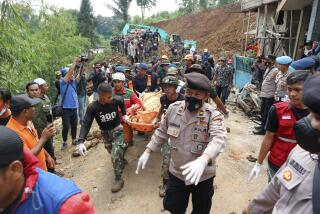Prayerful Balinese Gather to Purge Bombing Site of Evil
- Share via
KUTA, Indonesia — In an elaborate ceremony of prayer and animal sacrifice, thousands of Balinese Hindus gathered Friday to drive away evil and purify the site where 191 people died last month in a car bombing.
The islanders asked for forgiveness, prayed for the victims of the attack and expressed hope that visitors from around the world will soon come back to their homeland.
“No more blood and tears in Bali,” Indonesian Welfare Minister Yusuf Kalla told the crowd. “Bali must be returned as a land of opportunity, a land of joy and happiness.”
The worshipers, wearing their finest clothes and carrying small offerings, sat cross-legged in the street in orderly rows that stretched for blocks from the crater left by the Oct. 12 blast.
A temporary temple was erected in the rubble of the destroyed Sari nightclub, the main target of the attack. Surrounded by gutted buildings and piles of debris, high priests sat on a wooden platform and led the crowd in prayer and chanting.
One priest, seemingly in a trance, slashed the throat of a pig and drank blood from the animal’s neck. At a nearby ceremonial site at Kuta beach, other priests took two calves out to sea in small boats, weighted them down and pushed them overboard.
In all, 79 animals were sacrificed for the ceremony, including roosters, ducks, dogs, pigs, goats, cows and water buffalo.
Organizers of the event said such sacrifices are a long-held tradition and were a necessary step in restoring balance to the universe after the bombing. The animals will be reincarnated as humans, they said.
Balinese Hindus are deeply religious, and every house has its own temple. There are ceremonies to mark all major occasions, including births, deaths, birthdays, marriages, the purchase of property and the construction of a house.
Friday’s ceremony was one of the biggest and most intricate ever held on the island, organizers said, and most of Bali’s 3.2 million people were involved.
In villages and towns across the island, they said, people who didn’t come to the bomb site held small ceremonies at local temples or at home to pray for the victims and drive out evil.
Officials estimated that more than 10,000 people attended the main ceremony. The worshipers lined up facing the bomb site, even though few were close enough to see it.
Sastra Wayan, 38, manages a restaurant near the site that has been closed since the blast. After the purification was complete, he said, he would be able to reopen today.
“I am sitting here to take part in the ceremony to cleanse the location of the evil spirits,” he said shortly before the prayers began. “At the moment, this place is like a cemetery, and we want to purify it so people can live in this area again.”
The Balinese Hindus have maintained their unusual culture for centuries despite being surrounded by Muslims, who today make up the vast majority of Indonesia’s population.
The bombing was the biggest disaster to strike Bali in living memory and has devastated the island’s tourism industry, one of its biggest sources of income. Some hotels report occupancy of less than 10%.
Authorities believe the bombing was carried out by Islamic terrorists seeking to create chaos in Indonesia that would lead to the formation of an Islamic state.
One suspect has been arrested -- a devout Muslim who goes by the name Amrozi and is connected with an Islamic school in a remote village in East Java province. He has confessed to buying the car and explosives used in the bombing and has told police that one of his six brothers, Ali Imron, a teacher at the school, also was involved. Police are looking for as many as nine more suspects.
“We are happy that he is arrested, and we also pray that the police will be able to arrest the others,” said Luh Kamiyati, 40, a doctor who attended Friday’s ceremony. “We hope that the perpetrators will be brought to justice, and we pray this tragedy will never happen again.”
Despite Amrozi’s confession, many Balinese blame themselves for the bombing. Some say they became too lax in praying and holding ceremonies in the Kuta area, one of the more commercial parts of the island.
“We feel responsible for what happened,” Dewi Darmawati, 26, said after taking part in the ceremony. “We don’t know what we did wrong. Maybe we forgot God, or forgot to pray to God, but we feel responsible for what happened.”
Among those attending were Indonesian officials, foreign ambassadors and families of the victims, including many from Australia who flew to Bali at the Indonesian government’s expense. President Megawati Sukarnoputri, who has said little about the bombing despite having visited the scene twice, did not attend.
“Our hearts go out to the Balinese people for having endured this terrible tragedy,” said U.S. Ambassador Ralph Boyce, who attended the event. “But today’s ceremony also marked our mutual commitment to continue the struggle against terrorism.”
Holy water was brought from special sites all over Indonesia. Dozens of priests dressed in white and carrying small silver buckets walked through the crowd, sprinkling it.
Most men wore traditional sarongs, and many wore T-shirts specially made for the occasion that read “Bali Loves Peace, 12 October, 2002.” A large peace sign was painted on one of the few fragments of the Sari Club still standing.
At the bomb crater--a hole in the street about 2 feet deep--people left offerings of flowers, money, eggs, rice, fruit and incense. Nearby, some families had posted photos of the loved ones they lost.
Organizers of the ceremony said workers would begin hauling debris from the Sari and another destroyed nightclub and dumping it in the sea today.
Many participants at the ceremony said they felt relieved afterward and were optimistic that the island would soon get back to normal.
“I feel like now we can return to what we had before the tragedy,” said Nyoman Kastika, 32, a driver who works near the blast site. “There will be a lot of tourists coming to Bali.”
More to Read
Sign up for Essential California
The most important California stories and recommendations in your inbox every morning.
You may occasionally receive promotional content from the Los Angeles Times.













